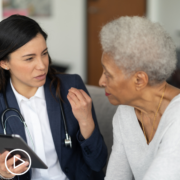AML Diagnosis Disparities | Factors Impacting Underrepresented Racial and Ethnic Groups
AML Diagnosis Disparities | Factors Impacting Underrepresented Racial and Ethnic Groups from Patient Empowerment Network on Vimeo.
What factors contribute to AML diagnosis disparities? Expert Dr. Sara Taveras Alam from UTHealth Houston discusses disparity factors in underrepresented patient groups and patient advice for newly diagnosed AML patients.
[ACT]IVATION Tip
“…I would recommend that they take notes of their conversations with their providers, that they include through their caregivers, family members, and conversations about the care, bring them to visits. There is a lot to learn in the process of an AML patient. And it is all right to ask questions again and again. It is encouraged to ask questions until their understanding of what is going on and what the plan is. Patients really are their best advocates or should be their best advocate and should never assume.”
Download Resource Guide | Descargar guía de recursos
Related Resources:

|

Black and Latinx AML Patients | The Impact of Cultural Beliefs |

How Do AML Patients and Outcomes Differ by Population Groups? |
Transcript:
Lisa Hatfield:
Dr. Taveras, are there differences in the stage of AML at diagnosis between underrepresented compared to other racial and ethnic groups, and if so, what factors contribute to these disparities?
Dr. Sara Taveras Alam:
So when we think of cancer stages, we usually refer to stage I through stage IV. Stage I being the cancer is localized to where it started, for example, breast, lung cancer, just in that breast, just in that lung, small and as things spread farther and farther from where they started, then you have stage II, stage III, stage IV, so for AML, it is a blood cancer, so technically, it’s all through our body, since our blood goes through the body.
There may be patients that present with no complications from their AML, and we’re assuming that they present it properly from when their diagnosis, from when their disease started. And other patients that may present with some complications from their acute myeloid leukemia already, so there the assumption is that acute myeloid leukemia has been ongoing for some time, but it is really hard to really determine when the acute myeloid leukemia started unless the patient had been undergoing very frequent blood work previously.
We do know that patients who are Black tend to present with AML at a younger age, and we’re not sure what factors contribute to that. We also know that they may be at higher risk of complications during treatment as our Hispanic patients.
We also know that their diseases may be more resistant to treatment and associated to mutations that are more aggressive. So those are the factors that contribute.
A lot goes into the treatment responses for our patients, and we want to achieve a remission and maintain a remission, and these patients require frequent healthcare visits and they may have barriers to that, depending on their work, childcare, transportation, there may be many barriers for these underrepresented patients that they themselves don’t feel as though the healthcare team needs to know about, but it is very important for us to know about these barriers so that we can do our best to address them and the patient can receive the care that will ultimately give them the best chances of survival and response to treatment.
Lisa Hatfield:
Dr. Taveras, do you have any general tips for patients who receive a diagnosis of AML?
Dr. Sara Taveras Alam:
Yeah, so for any patient with a new diagnosis of cancer and especially acute myeloid leukemia, I would recommend that they take notes of their conversations with their providers, that they include through their caregivers, family members, and conversations about the care, bring them to visits. There is a lot to learn in the process of an AML patient.
And it is all right to ask questions again and again. It is encouraged to ask questions until their understanding of what is going on and what the plan is. Patients really are their best advocates or should be their best advocate and should never assume. They should ask when they don’t know what the plan is or when they want to make sure that things are going in the right track.



